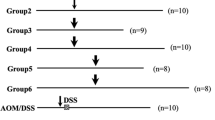Abstract
Background
An azoxymethane/dextran sulfate sodium (AOM/DSS) protocol has been developed for the induction in an animal model of the precancerous stages of colitis-associated carcinogenesis, by modification of the established (AOM/DSS protocol for carcinogenesis.
Methods
Female C57BL6 mice were treated with a single intraperitoneal dose (10 mg/kg of body weight) of AOM followed by three, 5-day, cycles of oral DSS, at different dosages, with each cycle interrupted by a 2-week rest period.
Results
The 3 mice in the group that were given three, 5-day, cycles of oral 2.5 % DSS all developed colonic adenomas with dysplastic lesions, but none had developed adenocarcinoma at 60 days. In contrast, of 6 mice treated with AOM administration along with either three, 5-day, cycles of 3.0% DSS or three, 7-day, cycles of 2.5% DSS, 5 had developed cancer at day 84 of the experiment. These results suggest that the administration of three, 5-day, cycles of 2.5% DSS following an initial dose of AOM may successfully induce adenoma formation in female C57BL6 mice at day 60, without the concurrent presence of carcinoma.
Conclusion
This modification of the widely used AOM/DSS protocol for induction of colonic carcinoma may constitute a novel approach for investigating colitis-related colonic adenomas.
Similar content being viewed by others
References
Grivennikov SI. Inflammation and colorectal cancer: Colitisassociated neoplasia. Semin Immunopathol 2013;35:229–44.
Neumann H, Vieth M, Langner C, et al. Cancer risk in IBD: how to diagnose and how to manage DALM and ALM. World J Gastroenterol 2011;17:3184–91.
Shanahan F. Review article: colitis-associated cancer —time for new strategies. Aliment Pharmacol Ther 2003;18 Suppl 2:6–9.
Kinzler KW, Vogelstein B. Lessons from hereditary colorectal cancer. Cell 1996;87:159–17.
Tanaka T. Preclinical cancer chemoprevention studies using animal model of inflammation-associated colorectal carcinogenesis. Cancers (Basel) 2012;4:673–700.
Tanaka T, Kohno H, Mori H. Chemoprevention of colon carcinogenesis by dietary non-nutritive compounds. Asian Pac J Cancer Prev 2001;2:165–77.
Sharpless NE, Depinho RA. The mighty mouse: genetically engineered mouse models in cancer drug development. Nat Rev Drug Discov 2006;5:741–54.
Neufert C, Becker C, Neurath MF. An inducible mouse model of colon carcinogenesis for the analysis of sporadic and inflammation-driven tumor progression. Nat Protoc 2007;2:1998–2004.
Tanaka T, Kohno H, Suzuki R, et al. A novel inflammation-related mouse colon carcinogenesis model induced by azoxymethane and dextran sodium sulfate. Cancer Sci 2003;94:965–73.
Thaker AI, Shaker A, Rao MS, et al. Modeling colitisassociated cancer with azoxymethane (AOM) and dextran sulfate sodium (DSS). J Vis Exp 2012;(67) pii: 4100.
Suzuki R, Kohno H, Sugie S, et al. Sequential observations on the occurrence of preneoplastic and neoplastic lesions in mouse colon treated with azoxymethane and dextran sodium sulfate. Cancer Sci 2004;95:721–7.
Corpet DE and Pierre F. How good are rodent models of carcinogenesis in predicting efficacy in humans? A systematic review and meta-analysis of colon chemoprevention in rats, mice and men. Eur J Cancer 2005;41:1911–22.
De Robertis M, Massi E, Poeta ML, et al. The AOM/DSS murine model for the study of colon carcinogenesis: From pathways to diagnosis and therapy studies. J Carcinog 2011;10:9.
Ward JM. Morphogenesis of chemically induced neoplasms of the colon and small intestine in rats. Lab Invest 1974;30:505–13.
Suzuki R, Kohno H, Sugie S, et al. Strain differences in the susceptibility to azoxymethane and dextran sodium sulfate-induced colon carcinogenesis in mice. Carcinogenesis 2006;27:162–9.
Author information
Authors and Affiliations
Corresponding author
Rights and permissions
About this article
Cite this article
Angelou, A., Andreatos, N., Antoniou, E. et al. A Novel Modified Model for Induction of Intestinal Adenomas in Female Mice. Hellenic J Surg 90, 289–292 (2018). https://doi.org/10.1007/s13126-018-0492-9
Received:
Revised:
Accepted:
Published:
Issue Date:
DOI: https://doi.org/10.1007/s13126-018-0492-9




